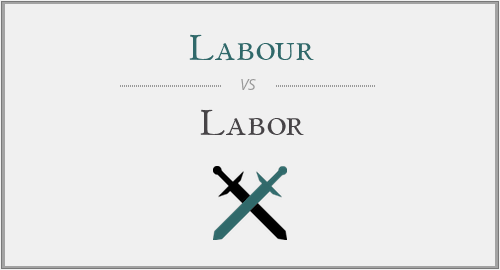English learners are sometimes confused when they see two words with very similar spellings and meanings. They read about them both and when the time comes to use that word in an essay, they are all confused. Which ones were the right ones? Was there a difference between the spellings? Should I use the first ones or the second ones? All these questions arise in the writer’s mind while trying to write a sentence which takes up most of their time and energy.
Labor (or labour) is one of those villain words and though very commonly used in English language it is a cause of confusion for most of the English speakers and writers. This article will throw light on both of the spellings and then will leave it to you to decide.
Origin:
The word labor originated from Middle English: from Old French labour (noun), labourer (verb), both from Latin labor which means ‘toil, trouble’.
Labor as noun:
Labor is used as a noun in English language where it means work, especially physical work.
The price of repairs includes labour, parts, and VAT.
Workers, especially manual workers, considered collectively are also referred to as labor.
The conflict of interest between capital and labour is causing a lot of uprising.
A government department concerned with a nation's workforce is known as labor too.
The Labour Secretary issued a new order.
Labor is also the process of childbirth from the start of uterine contractions to delivery.
His sister went to labor at the party.
Labor as verb:

Labor is used as a verb in English too where it mostly means to work hard or to make great effort.
They labored from dawn to dusk.
To have difficulty in doing something despite working hard is also called labor.
United labored against confident opponents, one can imagine the result!
Labor vs. Labour:
There is no difference in meaning between labor and labour. Labor is the preferred spelling in American English, and labour is preferred throughout the rest of the English-speaking world. One exception: In Australia, the American spelling is used in reference to the Australian Labor Party. In all other contexts, Australians use labour. This idiosyncrasy results from the influence of the American labor movement on the founders of the Australian Labor Party. The British Labour Party has the u. The switch from -our spellings to -or spellings was one of the major early developments in American English. Many distinctively American (or North American, in some cases) spellings weren’t settled until the second half of the 19th century or even later. But labor, along with many other -or words, became the prevalent spelling in the U.S. around 1840.
Examples:
Applications fell last week to a seasonally adjusted 383,000, reinforcing confidence that the labor market is on track to recovery. [Los Angeles Times]
Efforts to jump-start N.F.L. labor talks seem to have stalled. [New York Times]
Initial jobless claims fell by 36,000 to 383,000, the labour department said on Thursday. [Financial Times]
Ottawa is mulling ways to tap into the U.S. labour force as worker shortages loom on our side of the border. [CTV.ca]




Have a discussion about this article with the community:
Report Comment
We're doing our best to make sure our content is useful, accurate and safe.
If by any chance you spot an inappropriate comment while navigating through our website please use this form to let us know, and we'll take care of it shortly.
Attachment
You need to be logged in to favorite.
Log In